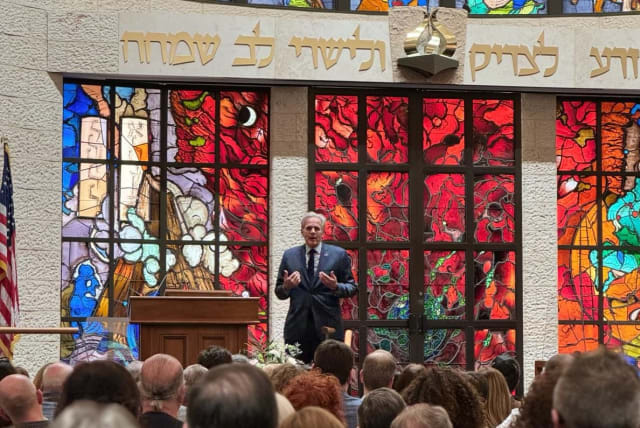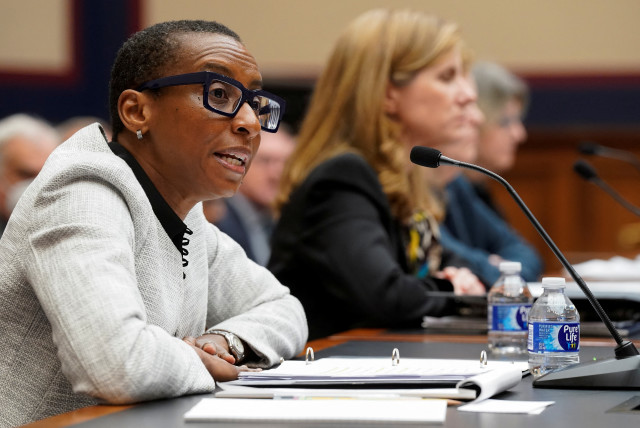Hamas has reminded us that we are a nation, a family - a mishpacha - opinion

I saw the confusion, I saw the fear, but also the unity and determination. Communities formerly at odds over ritual differences, have come together to advocate and demonstrate for Israel.
Anybody who’s ever concluded a speaking tour, especially one as long as mine—nine weeks—knows this feeling. Of being in an airport and not being able to say for sure what city it’s in or even the date of the month. All that remains are the impressions which, gathered in a time of desperate war, of a deepening sense of Jewish loneliness, and of skyrocketing antisemitism, are unprecedentedly profound.
In visits to several dozen Jewish communities across North America, I saw a degree of confusion and fear I never before encountered. People unfamiliar with antisemitism now confront it persistently and in multiple forms—in the Jew-hating slurs of pro-Palestinian protestors, in university administrators indifferent to their Jewish students’ plight, to the ovations received by comedians poking fun at Hollywood’s Jews, and filmmakers weaponizing the Holocaust against Israel.
Virtually every Israel supporter I met had lost friends because of that support. Though an occasional heckler accused Israel of causing antisemitism by killing Palestinians—internalizing the antisemitic claim that all Jews everywhere are liable for Israel’s actions—the vast majority of American Jews understood that rampant anti-Zionism merely exposed a latent Jew-hatred that existed well before October 7. All but a few realized that Israel’s security was directly linked to their own and that the state of American Jewry was severely threatened by attacks on the Jewish state.
Asked repeatedly, “What should we do?” I responded that American Jews could adopt one of three courses. They could remove the mezuzah from their doors, lock themselves in, and ignore all the prejudice outside. They could move to Israel. Or they could stay and fight. They could resist in the Churchillian sense, I explained, on the campuses, in the media, and through their elected officials. And Jews were only beginning to discover the many ways they can fight back.
Recalling the resignation of the presidents of Penn and Harvard, I reminded my listeners of their ability to exact a price from any official who fails to stand up to antisemitism. “Support pro-Israel media initiatives,” I urged them. “Support anti-boycott legislation.”
I saw the fear
I saw the confusion, I saw the fear, but also the unity and determination. Communities formerly at odds over ritual differences, have come together to advocate and demonstrate for Israel. Their contributions to Israel-related philanthropies have broken by far all previous records. So, too, has their participation in emergency missions to work on southern Israeli towns, visit wounded soldiers, and show solidarity with the families of the hostages. Bring Them Home dog tags and lapel ribbons are ubiquitous.
“For all the agony and the sorrow,” I observed. “Hamas has reminded us that we are a nation, a people, a family—a mishpacha.” And yet that oneness is threatened by political rifts that can often seem unbridgeable. Liberal audiences, I learned, are liable to interpret as pro-Trump any attempt to challenge the Biden Administration’s criticism of Israel. Conversely, failure to contrast that criticism with the previous president’s support for Israel can, in more conservative settings, evoke anger. The mere mention of the name Benjamin Netanyahu elicits powerful emotions both for and against.
Such reactions can prove frustrating for a speaker, even one who is not an American citizen, who’s striving to remain neutral in the presidential race and representative of the people of Israel rather than its government. My only recourse is to stress the depth and durability of the US-Israel alliance under successive administrations, and defend the policies espoused by virtually all Israelis, irrespective of their politics.
These distinctions may or may not have proven persuasive to individuals on the political fringe, but the bulk of American Jewry, I found, place their commitment to Israel above the partisan fray. They stand with us in Israel and alongside one another in combating antisemitism, countering anti-Zionism, and upholding Israel’s right to defend itself and exist as the Jewish state.
Though I may not, on this last leg of more than two months on the road, know exactly which airport I’m in or what the day of the week is, I’m certain of the message I’ll soon take home. Rarely before have our people been more united and we are not alone. Though the times are dark and the challenges myriad, with the help of an American Jewish community galvanized, mobilized, and ready to act, Israel will ultimately prevail.
Michael Oren, formerly Israel’s ambassador to the United States, Knesset Member, and Deputy Minister for Diplomacy, is the founder of the Israel Advocacy Group and author of the Substack, Clarity.
Jerusalem Post Store
`; document.getElementById("linkPremium").innerHTML = cont; var divWithLink = document.getElementById("premium-link"); if (divWithLink !== null && divWithLink !== 'undefined') { divWithLink.style.border = "solid 1px #cb0f3e"; divWithLink.style.textAlign = "center"; divWithLink.style.marginBottom = "15px"; divWithLink.style.marginTop = "15px"; divWithLink.style.width = "100%"; divWithLink.style.backgroundColor = "#122952"; divWithLink.style.color = "#ffffff"; divWithLink.style.lineHeight = "1.5"; } } (function (v, i) { });

